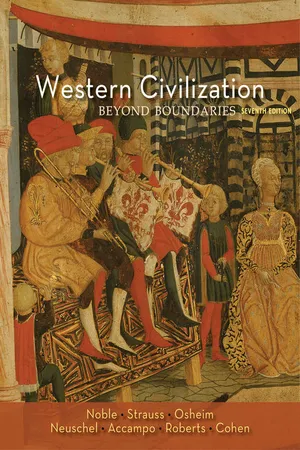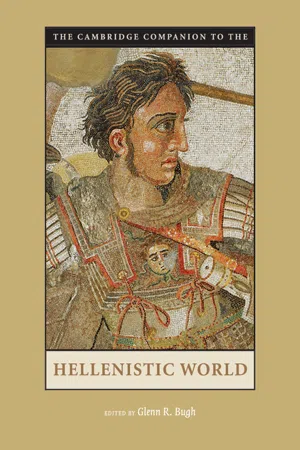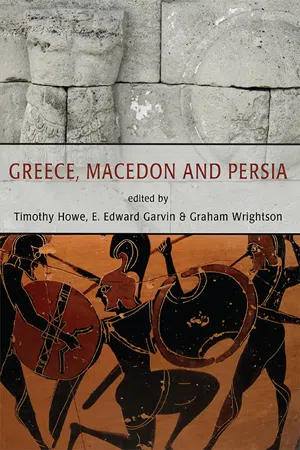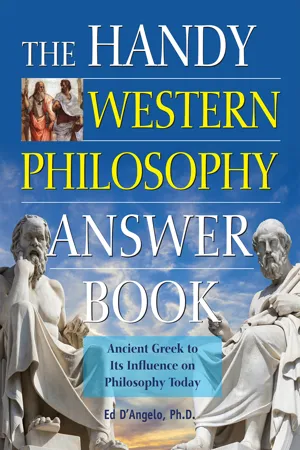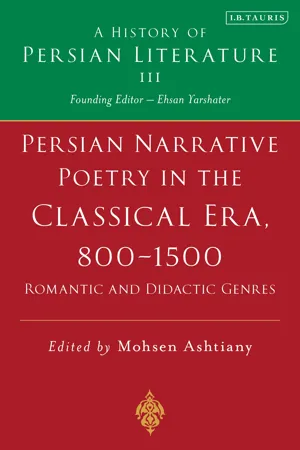History
Alexander III
Alexander III, also known as Alexander the Great, was the king of Macedonia from 336 to 323 BC. He is renowned for his military conquests, which expanded the Macedonian Empire to become one of the largest in the ancient world. His legacy includes the spread of Greek culture and the founding of many cities, which played a significant role in the Hellenistic period.
Written by Perlego with AI-assistance
Related key terms
1 of 5
5 Key excerpts on "Alexander III"
- eBook - PDF
Western Civilization
Beyond Boundaries
- Thomas F. X. Noble, Barry Strauss, Duane Osheim, Kristen Neuschel(Authors)
- 2013(Publication Date)
- Cengage Learning EMEA(Publisher)
240 B.C. After Alexander’s death, his empire lost its political unity. Great new cities and kingdoms arose in the lands he had conquered. © Cengage Learning 2014 Copyright 2012 Cengage Learning. All Rights Reserved. May not be copied, scanned, or duplicated, in whole or in part. Due to electronic rights, some third party content may be suppressed from the eBook and/or eChapter(s). Editorial review has deemed that any suppressed content does not materially affect the overall learning experience. Cengage Learning reserves the right to remove additional content at any time if subsequent rights restrictions require it. 90 Chapter 4 Alexander the Great and the Spread of Greek Civilization, ca. 350–30 B.C. Alexander died in Babylon in June 323 B.C., a month before he turned 33, probably of malarial fever, although some contemporaries suspected poison and some historians have suggested drunkenness. Alexander did not name a suc- cessor. The Macedonian generals fought a long and bloody round of wars over the spoils of empire. Not until some fifty years later, in 275 B.C., was it clear that three large king- doms—Macedon (under the Antigonid dynasty), Ptolemaic (tol-eh-MAY-ik) Egypt, and the Seleucid (seh-LOO-sid) realm—would inherit most of Alexander’s empire. The rest was divided among small kingdoms, federal leagues, and independent city-states (see Map 4.2). In the long run, Alexander’s life was far more influential than his death. His conquests did nothing less than lay the foundations of the Hellenistic world. Whether it was exalting a savior or debunking a hero, much of Hellenistic culture cen- tered on the myth of heroism that Alexander had engendered. Historians who insist that the individual is insignificant will rarely have a more challenging refutation than Alexander. - Glenn R. Bugh(Author)
- 2006(Publication Date)
- Cambridge University Press(Publisher)
In contrast, Alexander had been the great collector. He had under his direct or indirect control most of the armed forces of the Macedonian and Persian regimes, and the accumulated reserves of the Persian Empire were his to dispose of. The combination of ships, men, and money was irresistible during his lifetime, but was dispersed by his death. His career, it can be argued, was a continuous acquisition of power, with the resources of Macedonia enlarged by the vast reserves of bullion and 2 2 Alexander the Great manpower afforded by the Persian Empire. That was the foundation of an absolute monarchy that had practically no limits. But it was a monarchy based on external conquest and existed largely for conquest. It created a stage on which rival dynasts could compete for a supremacy none of them could achieve, and the military basis of it, the combi- nation of Macedonian, Asiatic, and mercenary forces, was dispersed between the contenders. Alexander remained a symbol of invincibility and world empire, but in practice, he had little concrete effect on the regimes that succeeded him. If there was a new age, it began in 319, when Antipatros returned to Macedonia with the two kings, one an infant, the other mentally incompetent, and in effect separated the Argead kingship from Alexander’s conquests in Asia. Bibliographical Note Droysen’s initial work on Alexander was published by G. Finke (Berlin, 1833), entitled Geschichte Alexanders des Grossen. It was reprinted, with an Introduction by Helmut Berve in 1931 (Alfred Kr¨ oner Verlag, Leipzig). The expanded second edition appeared as the first volume of Droysen’s Geschichte des Hellenismus (Gotha 1877–8), and was reprinted in 1952 (shorn of many of the footnotes) under the editorship of Erich Bayer. There is now a new edition, under the auspices of the Alpha Bank, which contains Droysen’s footnotes, expanded by bibliograph- ical references compiled (originally in Greek) by Renos, Herkos, and Stantes Apostolides.- eBook - PDF
- Timothy Howe, Erin Garvin, Graham Wrightson, Timothy Howe, Erin Garvin(Authors)
- 2015(Publication Date)
- Oxbow Books(Publisher)
Moreover, Macedonian dynasties dominated the Near East for almost three centuries. The Ptolemaic dynasty of Egypt endured until it was finally overthrown in 30 BCE by the future Roman emperor Augustus. In the final analysis, Alexander was successful in controlling a territory that stretched eastward from Macedonia across approximately 4000 miles and included a myriad of different peoples. Much of his success was due to his maintaining the governmental and cultural patterns of the subject populations. Moreover, he incorporated much of the existing power structure into his government. With the exception of the new urban foundations and the occasional garrison, his footprint on the local populations was light, but then his view of glory came from the submission not from the oppression of populations. In the one situation where a major insurrection did occur, that in Bactria and Sogdiana, it was suppressed. But his methods for dealing with resistance were brutal in the extreme. Indeed, part of his success in avoiding such conflicts came from this realization on the part of his potential opponents. This was especially the case when surrender to Alexander would often be followed by demonstrations of largesse, and resistance most often meant death and destruction. Bibliography Abdullah el-Rasiq, M. (1984) Die Darstellungen und Texte des Sanktuars Alexanders des Grossen im Tempel von Luxor. Mainz. Anson, E. M. (2004) Eumenes of Cardia: A Greek Among Macedonians. Leiden and Boston. — (2013) Alexander the Great: Themes and Issues. London and New York. — (forthcoming 2014). Alexander at the Beas. In E. Baynham and P. Wheatley (eds.) East and West in the Empire of Alexander. Oxford. Ashton, N. G. (1983) The Lamian War. A false start? Antichthon 17, 47–63. Badian, E. (1958) Alexander the Great and the unity of Mankind, Historia 7, 225–449. — (1965) The Administration of the Empire, Greece & Rome 12, 166–82. - eBook - ePub
The Handy Western Philosophy Answer Book
The Ancient Greek Influence on Modern Understanding
- Ed D’Angelo, Ed D'Angelo(Authors)
- 2020(Publication Date)
- Visible Ink Press(Publisher)
Several ancient historians record Alexander expressing the same sentiment. Hephaestion served as Alexander’s second in command and commander of the elite Macedonian cavalry, the best in the ancient world. Hephaestion was not only Alexander’s closest friend but throughout his military campaigns also his most trusted advisor and confidante. When, in 327 B.C.E., Alexander married his second wife, Stateira II, the daughter of Darius III, the last king of the Achaemenid Empire of Persia, he arranged for Hephaestion to marry her sister Drypetis, so that they would become brothers-in-law and they and their sons could rule an integrated Persian and Greek Empire. When Hephaestion died in 324 B.C.E., Alexander was inconsolable. He arranged an elaborate funeral for Hephaestion in Babylon, where a year later he himself died. What is the history of Alexander the Great’s military campaigns? At age sixteen, Alexander’s formal education ended and his military career began. His father, Philip II, went abroad to wage war on Byzantium, an ancient Greek colony that later became Constantinople and, later still, Istanbul, leaving Alexander behind to serve as regent of Macedonia. At once, a Thracian tribe revolted. Alexander put down the revolt, colonized the region with Macedonians, and founded a city that he named Alexandropolis. When his father returned, Alexander was dispatched to Thrace to put down other revolts and also successfully defended Macedonia from the Illyrians, who had invaded from the north. In 338 B.C.E., Alexander joined his father on a march south, culminating in the Battle of Chaeronea, where together they defeated an alliance of Greek states led by Athens and Thebes. Alexander is credited with defeating the Sacred Band of Thebes, the most elite unit of Theban warriors, which was composed of 150 pairs of male lovers - eBook - PDF
Persian Narrative Poetry in the Classical Era, 800-1500: Romantic and Didactic Genres
A History of Persian Literature, Vol III
- Mohsen Ashtiany(Author)
- 2023(Publication Date)
- I.B. Tauris(Publisher)
Czeglédy, “The Syriac Legend Concerning Alexander The Great,” Acta Orientalia Academiae Sci- entiarum Hungaricae 7 (1957), pp. 231-49; Gerrit J. Reinink, Das syrische Alexan- derlied. Die drei Rezensionen, (2 vols., Leuven, 1983); Stephen Gero, “The Legend of Alexander the Great in the Christian Orient,” BJR 75 (1993), pp. 177-86; Gerrit J. 404 PERSIAN NARRATIVE POETRY form, was produced around the year 630, as a political pamphlet in support of the attempt by Heraclius to reconsolidate his empire after the long and devastating war against the Persians. In this text, Alexander is presented as the most illustrious predecessor of Heraclius in the struggle of the Grae- co-Roman world against the Persians. It tells of two prophecies, the first carved by Alexander himself on the walls of the Gog and Magog Gate, fore- casting the apocalyptic moment when the wall would be breached and “the earth shall melt through the blood and dung of men.” The second proph- ecy is attributed to the Persian king, called Tubarlaq: once defeated by Al- exander, and after having agreed with him to share the task of âeguarding the barrier, he predicted that the Romans would conquer the entire world and rule it all before handing power over to the returning Messiah. The dates of these events, provided in the text, point exactly to the reign of Her- aclius (610-41). Through these “wall” prophecies we can see a reference to actual walls that Heraclius had to breach in his battles against the Persians, in his bid to recover the relics of the Holy Cross that the Persians had taken from Jerusalem fifteen years earlier. Alexander’s victory over the Persian king is presented here as anticipating that of Heraclius, which was to herald a new period of Christian power and peace over the world under Byzantine rule, before the return of the Messiah.
Index pages curate the most relevant extracts from our library of academic textbooks. They’ve been created using an in-house natural language model (NLM), each adding context and meaning to key research topics.
